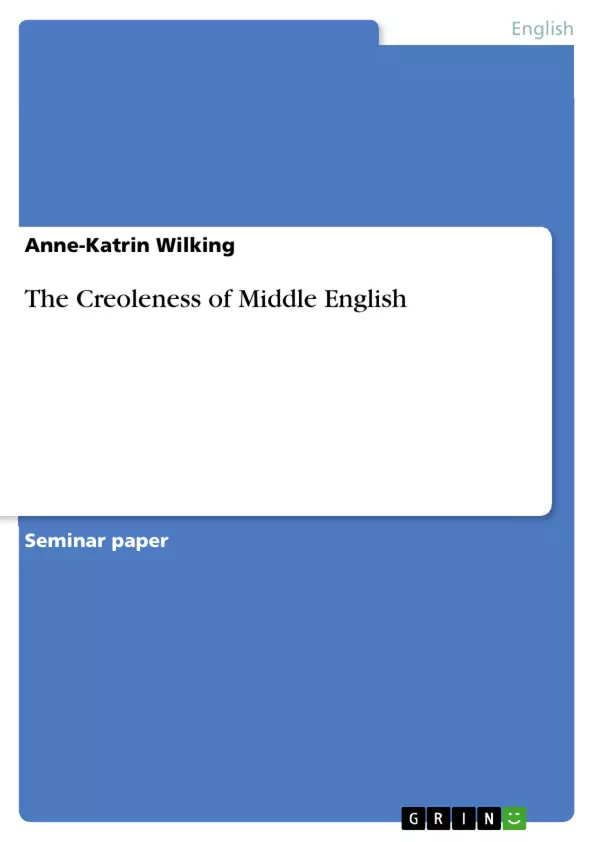...In this essay it will be argued that Middle English can not be considered a creole. First, I will define the word creole, and argue that, according to this definition, Middle English is not a good example of a creole. Then I will discuss some of the creolization criteria that have been used by Danchev in Fisiak. He claims that Middle English meets 7 criteria that would be characteristic of a creole language. I would like to argue that the arguments for the statement that Middle English would resemble a creole are not strong enough. Finally, I will look at the ‘creole hypothesis’, i.e. the hypothesis that Middle English would be a creole, in a sociohistorical and sociolinguistic framework. In this respect, I will state that Middle English could not be called a creole either....
Inhaltsverzeichnis (Table of Contents)
- The creoleness of Middle English
- Middle English: a creole or not?
- Defining creole and pidgin
- Criteria of creolization
- Simplified segmental phonology
- Lack of (or reduced) noun morphology
- Lack of grammatical gender
- SVO order
- Verbal periphrases
- Relexification
- Overall analyticity
- The 'creole hypothesis'
- Old Scandinavian mixing with Old English
- Old French mixing with Old English
- Conclusion
Zielsetzung und Themenschwerpunkte (Objectives and Key Themes)
This essay aims to argue against the view that Middle English can be considered a creole language. It examines the definition of creole and pidgin, evaluates the criteria of creolization in the context of Middle English, and analyzes the ‘creole hypothesis’ within a sociohistorical and sociolinguistic framework.
- Defining the terms "creole" and "pidgin" and applying these definitions to Middle English.
- Analyzing the creolization criteria proposed by Danchev and assessing their applicability to Middle English.
- Evaluating the sociolinguistic conditions that could have contributed to language mixture in the cases of Old Scandinavian mixing with Old English and Old French mixing with Old English.
- Presenting a comprehensive argument against the notion that Middle English is a creole.
Zusammenfassung der Kapitel (Chapter Summaries)
- The essay begins by defining the terms “creole” and “pidgin” and arguing that Middle English does not meet the characteristics of a creole due to the lack of a preceding stable pidgin.
- The essay then explores seven creolization criteria proposed by Danchev, examining each criterium in the context of Middle English and presenting arguments against the claim that Middle English meets all of these criteria.
- The essay further analyzes the ‘creole hypothesis’ within a sociohistorical and sociolinguistic framework, focusing on the specific conditions that may have contributed to language mixture in the cases of Old Scandinavian and Old French interaction with Old English.
Schlüsselwörter (Keywords)
The main keywords and focus topics of the text include creole, pidgin, Middle English, creolization criteria, sociohistorical framework, sociolinguistic conditions, language mixture, Old Scandinavian, Old French, Old English, and the ‘creole hypothesis’.
Frequently Asked Questions
Is Middle English considered a creole language?
The essay argues that Middle English cannot be classified as a creole, primarily because it lacks a preceding stable pidgin stage.
What are the criteria for a language to be a creole?
Criteria include simplified phonology, lack of noun morphology, lack of grammatical gender, SVO word order, and overall analyticity.
What is the 'creole hypothesis' regarding Middle English?
It is the theory that Middle English formed as a result of intense language mixing between Old English and Old Scandinavian or Old French, similar to creolization.
How did Old Scandinavian influence Old English?
The influence was significant due to social contact, but the essay states this mixture does not meet the strict sociolinguistic requirements of a creole.
What is relexification in linguistics?
Relexification is a process where the vocabulary of one language is replaced by that of another while the grammar remains largely intact, a common feature in creoles.
- Quote paper
- Anne-Katrin Wilking (Author), 2011, The Creoleness of Middle English, Munich, GRIN Verlag, https://www.grin.com/document/177149



